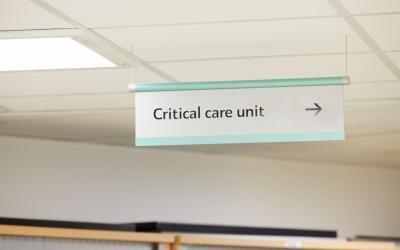The working life of a mental health nurse

Mental health nurses work with people with conditions from anxiety to schizophrenia, helping to develop and deliver care plans and empower these patients to manage their future health. Sarah Harrop explores what this rewarding career entails.
What is mental health nursing and how does it differ from nursing?
General nurses treat and care for patients’ physical health, while mental health nurses specialise in caring for patients who have mental health problems or difficulties with their living circumstances, or both. Also known as psychiatric nurses, mental health nurses are an important sub-specialty within the vast field of nursing.
According to the World Health Organization (WHO), one in every eight people in the world lives with a mental disorder, which is defined as significant disturbances in a person’s thinking, regulation of emotions or behaviour. In 2020, the COVID-19 pandemic caused a significant rise in the number of people living with anxiety and depressive disorders with initial estimates showing a 26% and 28% increase respectively for anxiety and major depressive disorders in just one year. Therefore mental health care professionals are much in demand.
Some of the most common mental health conditions which mental health nurses provide care and treatment for include:
Anxiety Disorders – in which people have excessive fear, worry and related behavioural disturbances, e.g. generalised anxiety disorder, panic disorder, social anxiety or separation anxiety disorder. In 2019, 301 million people were living with an anxiety disorder including 58 million children and adolescents.
Depression – affecting an estimated 280 million people around the world in 2019, depression is when a person feels sad, irritable, empty or has a loss of pleasure or interest in activities for most of the day, nearly every day, for at least two weeks.
Bipolar Disorder – alternating depressive episodes with periods of manic symptoms such as euphoria, increased activity or energy reckless and impulsive behaviour. This mental health condition affects around 40 million people, according to 2019 estimates.
Post-Traumatic Stress Disorder (PTSD) – this mental health issue develops after a person is exposed to threatening or horrific events and involves flashbacks or nightmares, avoidance of reminders of the event and heightened perception of threat.
Schizophrenia – in this relatively common mental health disorder, affecting around 24 million people worldwide, perception and changes in behaviour are significantly impaired. Symptoms include psychosis, delusions, hallucinations and extreme agitation.
Eating Disorders – for example anorexia nervosa and bulimia nervosa, which involve abnormal eating, preoccupation with food and body weight or shape concerns. Around 14 million people suffer with eating disorders around the globe, including around 3 million children and adolescents.
In the United Kingdom, mental health nurses are an integral part of a team which includes GPs, psychologists, social workers, psychiatrists, occupational therapists, arts therapists and healthcare assistants.
Mental health nurses develop and deliver care plans in partnership with patients and empower them to manage their future mental health. This care includes both giving medications and using psychological intervention approaches as well as supporting patients when they are going through mental health crises or episodes.
In the NHS, mental health care nurses work across a variety of settings including academia, research, public health, health and social care commissioning, and within the Department of Health and Social Care.
What are the daily duties of a mental health nurse?
Being a ‘people person’ with top-flight interpersonal skills is an absolute must for a mental health nurse. They must be good at quickly building trusting relationships with people who use mental health services and their relatives and carers.
“Mental health nurses need excellent observational skills to assess patients, look for signs of tension or anxiety and be able to think quickly in unpredictable and sometimes violent situations. You’ll also need a non-judgemental attitude,” says registered mental health nurse Dean Malpass in a British Medical Journal report on mental health nursing.
Excellent communication skills are another ‘must-have’, because part of the role is to help people to understand the situation they are in and how to get the best possible outcome, referring them on to other professionals and services when it is needed.
Mental health nurses may help people to take their medication correctly and monitor them for any side effects. Or they might advise patients on relevant therapies or social activities that might be helpful. They must have good working knowledge about the legal context of their work, including Human Rights Law, Mental Health and Mental Capacity Law and nursing ethics. Furthermore, they must be able to spot people who are at risk of harming themselves or others.
As a mental health nurse you will usually be based on a psychiatric ward or specialist unit within a hospital. You might also work in a community health centre or in a person’s own home, working shifts and providing round-the-clock care.
According to the BMJ guide to careers in this field, some other typical daily tasks could include:
- Assessing patients to identify risks such as suicide or aggression and working with patients to reduce these risks
- Monitoring a patient’s physical health and well-being through observations of blood pressure, pulse and temperature
- Soothing distressed patients using verbal and non-verbal skills and finding ways to reduce and relieve stress
- Managing incidents and patients when they are having an episode or crisis
- Preparing the correct care documentation, including legal documentation, for patients who may be subject to elements of the Mental Health Act
- Leading teams or projects focused on service and quality improvement initiatives
- Teaching and supervising students
- Contributing to local and national policy.
What’s the career route to becoming a mental health nurse?
Most people complete a mental health nursing degree. The typical entry requirements for a nursing student are five GCSEs for English students, or N5 qualifications for Scottish students, and two A levels for English students, or Scottish Highers/Advanced Highers for Scottish students, or a foundation course which might also include a generalist nurse associate programme that allows people to practise as a support nurse when they have completed it.
There are also a range of nursing apprenticeships including degree apprenticeships in parts of the UK. Regardless of which route they take, successfully trained nurses need to register their qualification on the mental health nursing register of the Nursing and Midwifery Council (NMC), the regulator for nurses.
How can a general nurse switch to mental health nursing?
In parts of the UK, registered general nurses can do a fast-track mental health nursing conversion course over 18 months to two years, provided that they meet its prior learning requirements. It is worth noting that qualified nurses wishing to re-train as a mental health nurse might be eligible for financial support through the NHS Learning Support Fund.
Empowering patients to live healthier future lives
Considering your next move in your nursing career? The MSc Nursing at Queen Margaret’s University is aimed at professionally registered nurses anywhere in the world and from a range of health and well-being settings who want to broaden their understanding of nursing, learning in different contexts, and conducting master's degree-level study and research in their specific area of practice. Person-centredness and person-centred practice is at the heart of the Queen Margaret’s University Masters degree. This is a key concept in policy, frameworks and strategic plans, aimed at humanising health and social care experiences.
As a student on this programme, you will engage with your course materials and a wider postgraduate community of practice to develop and deepen your own professional practice, learning how to contribute to improved outcomes in mental health nursing.
Modules on the programme include how to lead person centred practice, making judgements and decisions in practice, working with vulnerable individuals and families, relational ethics, how to interpret evidence-based practice and understanding the research process.
What is more, as the course is 100% online, you’ll have the freedom and flexibility to study and boost your professional development from anywhere, anytime.
Author biography
Sarah Harrop is a freelance science writer and editor with nearly two decades’ experience of communicating about science. Before taking the plunge into freelancing she worked for the University of Reading writing stories about everything from reducing methane in cow burps to cannabis-derived epilepsy drugs. She worked for nearly a decade at the Medical Research Council (MRC) where she edited the MRC’s magazine, wrote and produced its Annual Review and contributed to its podcast, blog and website. In the distant past she dabbled in travel writing, winning a Guardian Young Travel Writer of the Year award. She has a BSc in biological sciences from Sheffield University and a certificate in journalism from Birkbeck College.

















The information below is required for social login
Login to your Account